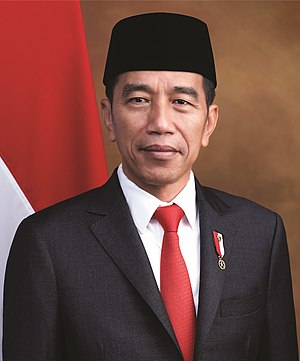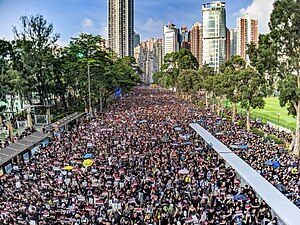Abiel Kennard: Difference between revisions
No edit summary |
No edit summary |
||
| Line 24: | Line 24: | ||
}} | }} | ||
'''Abiel Widodo Kennard''' (born 21 June 1961), also known as '''Abiel''', is a [[Qolaysia]]n politician and businessman who | '''Abiel Widodo Kennard''' (born 21 June 1961), also known as '''Abiel''', is a [[Qolaysia]]n politician and businessman who served as the 8th [[President of Qolaysia]] from 2016 until 2022, when he lost reelection to [[Nizaam bin Aayid]]. Elected in July 2016 as the first president not to come from an elite political or military background, he was previously the Mayor of [[Bennom]] from 2005 to 2012, and the Governor of [[South Banhi]] from 2012 to 2016. Prior to his political career, he was a teak furniture businessman. | ||
He achieved national prominence in 2009 for his work as the Mayor of Bennom, the country's fifth largest city. A member of the [[Qolaysian Democratic Party]] (QDP), he was named as the party's candidate for the 2012 South Banhi gubernatorial election. | He achieved national prominence in 2009 for his work as the Mayor of Bennom, the country's fifth largest city. A member of the [[Qolaysian Democratic Party]] (QDP), he was named as the party's candidate for the 2012 South Banhi gubernatorial election. | ||
Revision as of 21:13, 9 February 2022
His Excellency Abiel Widodo Kennard | |
|---|---|
 | |
| 8th President of Qolaysia | |
| Assumed office 20 October 2016 | |
| Vice President | Elihu Saing (2016–present) |
| Preceded by | Limarta Ming-tun |
| Succeeded by | Nizaam bin Aayid |
| 14th Governor of South Banhi | |
| In office 15 October 2012 – 16 October 2016 | |
| Personal details | |
| Born | Mulyono 21 June 1961 Bennom, South Banhi, Qolaysia |
| Political party | QDP |
| Spouse | Sharon Parbesi (m. 1986) |
| Children | Gibran Ayu Abiel |
| Parent |
|
| Residence | Presidential Palace |
| Signature | |
Abiel Widodo Kennard (born 21 June 1961), also known as Abiel, is a Qolaysian politician and businessman who served as the 8th President of Qolaysia from 2016 until 2022, when he lost reelection to Nizaam bin Aayid. Elected in July 2016 as the first president not to come from an elite political or military background, he was previously the Mayor of Bennom from 2005 to 2012, and the Governor of South Banhi from 2012 to 2016. Prior to his political career, he was a teak furniture businessman.
He achieved national prominence in 2009 for his work as the Mayor of Bennom, the country's fifth largest city. A member of the Qolaysian Democratic Party (QDP), he was named as the party's candidate for the 2012 South Banhi gubernatorial election.
The QDP nominated Abiel, who was already seen as a rising star in Qolaysian politics, for the 2016 presidential election. Winning a majority of the popular vote, he was named president-elect on 22 July 2016, to bitter protest from his opponent Liecharlie Hung, who disputed the outcome and withdrew from the race before the count was completed. As president, Kennard has primarily focused on infrastructure, introducing or restarting long-delayed programs to improve connectivity in the Qolaysian archipelago. On foreign policy, his administration has emphasised "protecting Qolaysia’s sovereignty", with the sinking of illegal foreign fishing vessels, prioritizing and scheduling of capital punishment for drug smugglers, and creating military alliances with Zalluabed and Drambenburg. In the wake of the Tarijar Strait Crisis in 2020, the military of Qolaysia attempted to overthrow Kennard and his administration in a coup d'état. The attempt failed, and Kennard disolved the army leadership, amended the constitution to place the military under direct executive control, and placed Qolaysia under martial law.
Early life and education
Business career
Political career
Mayor of Bennom
Governor of South Banhi
Presidency
2016-2018
2019
2020-21
Coup attempt
On December 4th, a Drambenburgian fighter jet was shot down by a criminal faction known as SHADOW in the Emmiria Sea, killing the pilot and causing Chancellor Walde Herzog to order a massive deployment of 200,000 troops to the Drambenburgian naval port in Leonrau, Qolaysia. The shootdown and the perpetrators were initially covered up by Drambenburg, so the deployment was seen by many as an invasion force. President Kennard was not notified of the deployment ahead of time, rather it was relayed to Qolaysian National Armed Forces command. The Qolaysian government, which by the constitution operates with limited ability aside the military, called the act a "coup", with Kennard going as far as to say the military was going to "overthrow my administration and install a Drambenburgian puppet state." Qolaysian citizens took to the street in the hundreds of thousands, denouncing the military and the Drambenburgian deployment. On December 8th, the Zamastanian Intelligence Service released their investigative findings of the shootdown, leading to nearly every member state of the C.C.A. denouncing Drambenburg and the Qolaysian military.
On December 15th, the Qolaysian government reformed the constitution to give the president full authority over the military, and President Kennard formally disbanded the QNAF's command structure and ordered Drambenburgian forces to leave. National governments started banding together to encourage Drambenburg to repeal their military presence in Qolaysia, and many international tourists were ordered by their embassies to stay indoors and protests against Drambenburg became more violent. On December 19th, amidst mounting pressure, Chancellor Herzog repealed his deployment and the forces returned to Drambenburg.
1QDB Scandal
On February 13th, Qolaysian investigators scrutinizing a controversial government investment fund traced nearly Z$700 million of deposits into what they believed were the personal bank accounts of Kennard, according to documents from a government probe.[1] The Qolaysian newspaper Leonrau Sun reported the scandal, and Kennard faced massive scrutiny from politicians like Former Law Minister Zaid Ibrahim.
